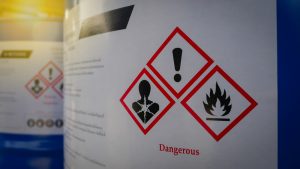Scientists working in the EPA’s New Chemicals Division recently filed a disclosure revealing several tactics managers use that prevent adequate safety assessments of new chemicals, according to Public Employees for Environmental Responsibility (PEER).
“One tactic managers have used to complete assessments within 90 days is forbidding assessors from communicating with other specialists,” according to PEER. “In their disclosure, scientists recounted being reprimanded for reaching out to other employees for advice and confirmation of their work.”
Staff shortages within the New Chemical program exacerbate the problem. Trained staff necessary for conducting chemical risk assessments are lacking in several specialties, including “inhalation toxicology, nanotechnology, cancer biology, animal pathology, epidemiology, developmental and reproductive toxicology, or inorganic chemistry,” PEER says. “Specialists can most easily fill in knowledge gaps by consulting with other specialists who have the requisite expertise; this is particularly important for less experienced employees.”
“Forbidding consultation is an abusive practice which compromises the scientific integrity of chemical assessments and prevents accurate hazard information from being completely reflected, to the ultimate detriment of worker and public safety,” PEER Executive Director Tim Whitehouse states. “These consultation restrictions make a mockery of EPA’s claim that it ‘uses an integrated approach that draws on knowledge and experience across disciplinary and organizational lines.’”
Further disclosures by the four whistleblowers describe the New Chemicals Division as a “black box” operating almost entirely out of the public eye that has now been opened to “reveal an office where mid-level managers and other employees commit acts of scientific fraud and harass scientists to quickly and efficiently serve the interests of the chemical industry,” according to PEER.
Additional evidence of a “rigged system” has been provided to PEER, which includes:
- “Any industry complaint puts a chemical assessment in a category called ‘hair on fire’ cases that the agency managers then prioritize for approval;
- Key managers move back and forth between jobs at the EPA and the chemical industry with scant revolving door or conflict of interest scrutiny; and
- Managers ignore risk indicators and intimidate staff into signing off on assessments with insufficient data to reach a conclusion.”
PEER’s Whitehouse “sent a letter to Dr. Michal Freedhoff, EPA’s Assistant Administrator for Chemical Safety and Pollution Prevention, requesting that she adopt a policy prohibiting restrictions on intra-agency communications and encouraging intra-agency consultation whenever appropriate or helpful,” notes PEER. “In addition, PEER is asking Dr. Freedhoff to discipline managers responsible for instituting, maintaining, or enforcing these prohibitions.”
These two actions would not interfere with the Office of Inspector General’s (OIG) investigations into the whistleblowers’ complaints and would send a powerful message to managers regarding the importance of integrity in completing chemical risk assessments, according to Whitehouse’s letter.
PEER asserts the Biden EPA administration is inconsistent in its pledges to address worsening agency practices.
“For example, a Regan memo pledging EPA ‘should be accessible to the press’ was followed by a directive from the Office of Pollution Prevention and Toxics forbidding employees ‘to answer press questions directly.’ Mr. Regan has not clarified whether agency employees may speak to reporters,” PEER adds.

